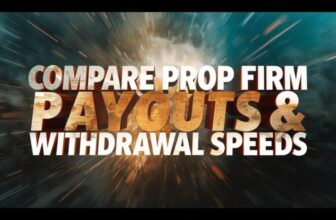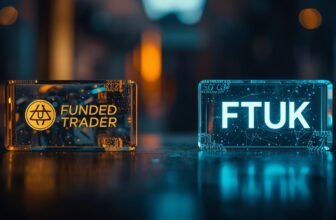
Navigating the world of proprietary trading can be like finding your way through a dense forest without a compass. The path to becoming a funded trader is filled with evaluation programs designed to test your skills, discipline, and trading acumen. But which of these evaluation programs truly stand out? Which ones offer the best blend of realistic conditions, fair assessment, and lucrative funding opportunities?
In this comprehensive guide, we’ll explore the best proprietary trading evaluation programs available today, dissecting their features, requirements, and potential benefits for traders at all experience levels.
What Are Proprietary Trading Evaluation Programs?
Proprietary trading evaluation programs are structured assessments designed by prop firms to identify skilled traders worthy of managing the firm’s capital. Think of them as the job interview process for traders – except instead of a 30-minute conversation, you’re demonstrating your trading abilities over weeks or months.
These programs typically involve trading a simulated account with specific profit targets, risk parameters, and trading rules. Successfully complete the evaluation, and you’ll gain access to a funded account where you can trade with the firm’s capital while keeping a significant percentage of the profits.
Why Are Evaluation Programs Important?
Evaluation programs serve multiple crucial purposes:
- They allow prop firms to mitigate risk by identifying disciplined, profitable traders
- They provide traders access to significantly larger capital than they might personally have
- They create a merit-based pathway into professional trading without requiring personal connections
- They establish clear expectations and trading parameters between the trader and the firm
How to Choose the Best Proprietary Trading Evaluation Programs
When evaluating different prop firm challenges, consider these key factors:
Account Size and Scaling Opportunities
The best proprietary trading evaluation programs offer various account size options, from smaller accounts (typically $10,000-$25,000) to larger ones ($100,000+). Many top firms also provide clear scaling plans – blueprints for how your account size can grow as you demonstrate consistent profitability.
For example, some firms increase your capital by 25% after every few months of profitable trading, potentially doubling your initial allocation within a year. This creates a clear growth trajectory for successful traders.
Profit Split and Payout Structure
Profit splits typically range from 50/50 to 90/10 (trader/firm). The industry standard hovers around 70/30 or 80/20 for most established firms. However, the best proprietary trading evaluation programs offer more than just attractive percentages – they provide reliable, consistent payout processes.
Look for:
- Clear payment schedules (weekly, bi-weekly, or monthly)
- Multiple payout methods (bank transfers, crypto, PayPal, etc.)
- Transparent fee structures without hidden costs
- No unnecessary delays or complex withdrawal procedures
Trading Rules and Restrictions
The most trader-friendly evaluation programs balance necessary risk management with reasonable flexibility. Common rules include:
- Maximum daily loss limits (typically 4-5% of account value)
- Maximum total drawdown limits (usually 8-10%)
- Profit targets (often 8-12% to pass the evaluation)
- Minimum trading days requirements
- Trading hours restrictions (especially for news releases)
The best proprietary trading evaluation programs implement these rules to encourage disciplined trading rather than to “trip up” traders with gotcha clauses.
Top Proprietary Trading Evaluation Programs in 2023
FTMO
FTMO consistently ranks among the best proprietary trading evaluation programs due to its established reputation, clear structure, and reliable payouts. Their two-phase evaluation process includes:
- Phase 1: Reach a 10% profit target within 30 days while respecting daily and maximum drawdown limits
- Phase 2: Demonstrate consistent trading over 60 days with a 5% profit target
- Funded Phase: Trade a real account with an 80/20 profit split
FTMO offers account sizes ranging from $10,000 to $200,000 and supports forex, commodities, indices, stocks, and cryptocurrencies. Their scaling program allows successful traders to significantly increase their allocation over time.
Best Proprietary Trading Evaluation Programs
Best Proprietary Trading Evaluation Programs
The Funded Trader
The Funded Trader has gained popularity for its simplified one-step evaluation process and competitive profit splits. Their key features include:
- One-phase evaluation with profit targets of 8-12% depending on the chosen program
- Rapid account funding after successful evaluation (typically 24-48 hours)
- Up to 90% profit splits for consistent performers
- Account sizes from $10,000 to $400,000
Their “Rapid” program offers an accelerated evaluation with higher profit targets but lower entry costs, making it attractive for confident traders looking to fast-track their funding.
Topstep
Topstep focuses primarily on futures trading and offers a two-step evaluation with clearly defined rules:
- Step 1: Meet a profit target while adhering to daily loss and trailing maximum drawdown limits
- Step 2: Demonstrate profitable trading with reduced risk parameters
- Funded Account: Trade with 80% profit splits and weekly payouts
Topstep stands out for its educational resources, trading community, and coaching options – making it one of the best proprietary trading evaluation programs for developing traders.
City Traders Imperium
City Traders Imperium (CTI) offers some of the most trader-friendly evaluation metrics:
- No strict profit targets (focus on consistent, methodical trading)
- Longer evaluation periods (up to 180 days)
- Up to 70% profit splits with clear scaling opportunities
- Account sizes from £10,000 to £100,000
CTI’s emphasis on trading psychology and long-term consistency makes it ideal for methodical traders who may need more time to express their edge.
Tips for Successfully Passing Proprietary Trading Evaluations
To maximize your chances of passing the best proprietary trading evaluation programs:
Focus on Risk Management First
The number one reason traders fail evaluations is violating risk parameters. Treat capital preservation as your primary objective, with profit targets as a secondary goal. A methodical approach that preserves capital will naturally create opportunities for hitting profit targets.
Understand the Specific Rules
Each firm has slightly different rules. Some count floating drawdown, others only realized losses. Some allow weekend holding, others don’t. Before starting any evaluation, thoroughly understand all rules and build your trading plan around them.
Start with Smaller Position Sizes
Begin with smaller positions than you might normally trade, gradually increasing size as you build a buffer. This prevents early losses from putting you in a difficult position.
Develop a Clear Trading Plan
Document your trading strategy, including:
- Which markets you’ll trade
- Your specific entry and exit criteria
- Position sizing rules
- Daily/weekly loss limits (more conservative than the program requires)
- Trading schedule and routine
Common Questions About Proprietary Trading Evaluation Programs
How much do the best proprietary trading evaluation programs cost?
Evaluation fees typically range from $100 to $1,500 depending on the account size and firm. Many firms offer discounts for multiple attempts or smaller account sizes. Some newer firms have introduced “free” challenges, though these often come with higher profit targets or more restrictive trading rules.
What markets can I trade during evaluations?
This varies by firm, but the best proprietary trading evaluation programs typically offer:
- Forex (major, minor, and exotic pairs)
- Indices (S&P 500, NASDAQ, DAX, etc.)
- Commodities (gold, silver, oil)
- Futures contracts
- Equities (individual stocks or CFDs)
- Cryptocurrencies (at select firms)
Are proprietary trading evaluation programs legitimate?
The best proprietary trading evaluation programs are legitimate business operations that make money through evaluation fees and by scaling successful traders. However, the industry also attracts questionable operators. Research thoroughly, check reviews, verify payout proof, and confirm the firm has an established track record before committing.
How long do most evaluations take to complete?
Evaluation periods typically range from 30 to 180 days, depending on the firm and program structure. Single-phase evaluations might be completed in as little as a week if you hit the profit target quickly, while multi-phase programs usually require at least 1-2 months.
Conclusion: Choosing the Best Proprietary Trading Evaluation Program
The best proprietary trading evaluation programs strike a balance between challenging parameters that ensure trader discipline and achievable targets that allow skilled traders to showcase their abilities. When selecting a program, consider your trading style, risk tolerance, preferred markets, and financial situation.
Remember that even with the best proprietary trading evaluation programs, success ultimately depends on your trading skill, psychology, and discipline. View the evaluation process not just as a hurdle to overcome, but as valuable training that will improve your trading regardless of the outcome.
The prop trading landscape continues to evolve, with firms constantly adjusting their offerings to attract talented traders. By understanding the core elements that make up the best proprietary trading evaluation programs, you’ll be well-positioned to select the right opportunity for your trading journey and potential career as a funded trader.
Recommended Prop Firm Reviews
TradeDay – Elite market access for everyone
Alpha Capital – Superior trader support and coaching
Crypto Fund Trader – First-rate crypto investment system
FTUK – Where Elite mentors guide your journey








